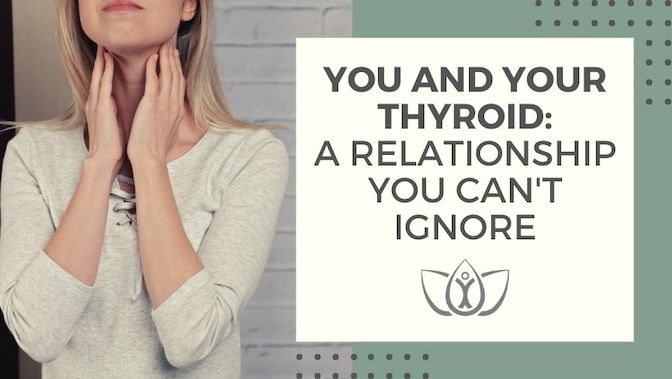The following article was originally published in Health Keepers, a magazine created by Trinity's founder, Dr. Wendell Whitman. This article appeared in Volume 2 • Issue 1 • Spring 1999, pg 18-19. This article, originally titled "You and Your Thyroid: A Relationship You Can't Ignore," was written by Raymond M. Lombardi, D.C., N.D., C.C.N..
Do you wake up tired? Have no energy? Lack mental clarity? Suffer from bouts of emotions associated with depression or irritability? Are you sensitive to the cold? Suffer from hair loss? Have difficulty losing weight? Have dry, scaly skin? Suffer from frequent headaches? Get recurrent infections? If any of these manifestations are affecting you, your thyroid gland may be the culprit.
The thyroid gland sits at the front of the neck like a “bow-tie,” just below the larynx (voice box). The thyroid is often called the “metabolism gland” of the endocrine system because it is so influential to the function of the whole body.
The thyroid gland's main function is the production and secretion of a group of critical hormones. The thyroid hormones include thyroxine (a combination of the protein tyrosine and iodine—designated T4), triiodothyronine (T3), T2 and T1, and calcitonin. The main hormone of this group is thyroxine. Thyroxine affects the growth rate and metabolism of all of the body's cells. It controls and regulates the rate at which the body produces and releases energy from foods. This, in turn, is used by the body for increasing basal metabolism. Thyroxin's production and secretion are controlled by the pituitary gland, which secretes Thyroid Stimulating Hormone (TSH). Thyroid Stimulating Hormone causes the thyroid gland to increase production and release thyroxine.
For a variety of reasons, the thyroid may begin to function improperly, secreting less of its critical hormones. When this happens, it is termed hypothyroidism. The manifestations listed at the beginning of this article can be the result. When problems develop with the thyroid gland, especially if the thyroid is overactive or severely underactive, one medical approach is to remove the thyroid gland surgically or to irradiate it, effectively “killing” the gland. When these procedures are done, replacement thyroid therapy is given. The problem is that only one synthetically produced hormone, thyroxine (e.g., Synthroid, Levothroid, Levothyroxine, etc.), is provided. There are a number of reasons why this may not be a good idea. There are a “group” of thyroid hormones working in concert which are critical to life, not just one. Because of their wide-spread effects on the body, a lack of these hormones can have profound consequences for health and longevity.
Natural Approaches To A Healthy Thyroid:
There are a variety of natural approaches available to promote the health of the thyroid gland, including diet, supplementation, and exercise.
A diet consisting of whole foods should be your first line of defense in keeping your thyroid gland healthy. Try eating a balanced diet consisting of plenty of fiber, fruits, vegetables (dark green and yellow), whole grains, nuts, and seeds. These groups will be highest in the vitamins and minerals the thyroid needs. Protein is important in moderation. Use both fish and poultry sources. Try consuming foods high in iodine, which include fish, kelp, and most vegetables. You could also consider eating multiple small meals every day. This is especially important if your thyroid is underactive or you are attempting to lose weight. Your metabolism will already be slowed down, which will only make these situations more difficult.
If you aren’t able to get vital nutrients from your diet, then supplementation may be useful for both maintaining a healthy thyroid and improving one that is underactive. Vitamins A and E, along with zinc, are necessary for the manufacturing of thyroid hormones. Vitamin A is also needed to absorb iodine. Vitamin C, riboflavin (B2), niacin (B3), pyridoxine (B6), and cobalamin (B12) are necessary for normal thyroid regulation and hormone manufacturing. A potentially helpful supplement for hypothyroidism is lyophilized or desiccated natural thyroid or a thyroid extract. These “natural” thyroid versions contain all of the needed thyroid hormones, not just thyroxine. If you are taking one of the synthetic thyroid hormone replacements, calcium and magnesium may need to be supplemented to offset bone loss. All of these supplements are available at your health food store.
Exercise is another useful element in the health of your thyroid. Exercise stimulates the thyroid gland secretions and increases tissue sensitivity to thyroid hormone. It also increases your metabolism and burns fat during weight loss.
Your thyroid gland is integral to health and life. Take care of it so it can take care of you!
Recommended Reading:
-Alternative Medicine: The Definitive Guide by The Burton Goldberg Group Future Medicine Publishing, Inc., Tiburon, California.
-Encyclopedia of Natural Medicine by Michael Murray, N.D. and Joseph Pizzorno, N.D., Prima Publishing.
-Hypothyroidism: The Unsuspected Illness by Broda O. Barnes, M.D. Harper & Row, Publishers, New York, New York.
References:
Arem, R. and D. Escalante. 1996. “Subclinical Hypothyroidism: Epidemiology, Diagnosis, and Significance.” Adv Intern Med 41:213-50.
Barnes, Broda O., M.D. and Lawrence Galton. 1976. Hypothyroidism: The Unsuspected Illness. New York: Harper & Row Publishers.
Bennet, J.C. and F. Plum. 1996. Cecil Textbook of Medicine. 20th ed. Philadelphia: W.B. Saunders Co. pp. 1227-1245.
Farwell, A. and L. Braverman. 1996. “Thyroid and Antithyroid Drugs.” In: Hardman, J. and L. Limbird,eds. Goodman & Gilman's The Pharmacological Basis of Therapeutics. 9th ed. New York: McGraw-Hill.
Saunders, C. 1996. “When the Thyroid Gland Isn't Working Right.” Current Health 22:30-1
Note: This article was edited to adhere to current legal and practical standards.


